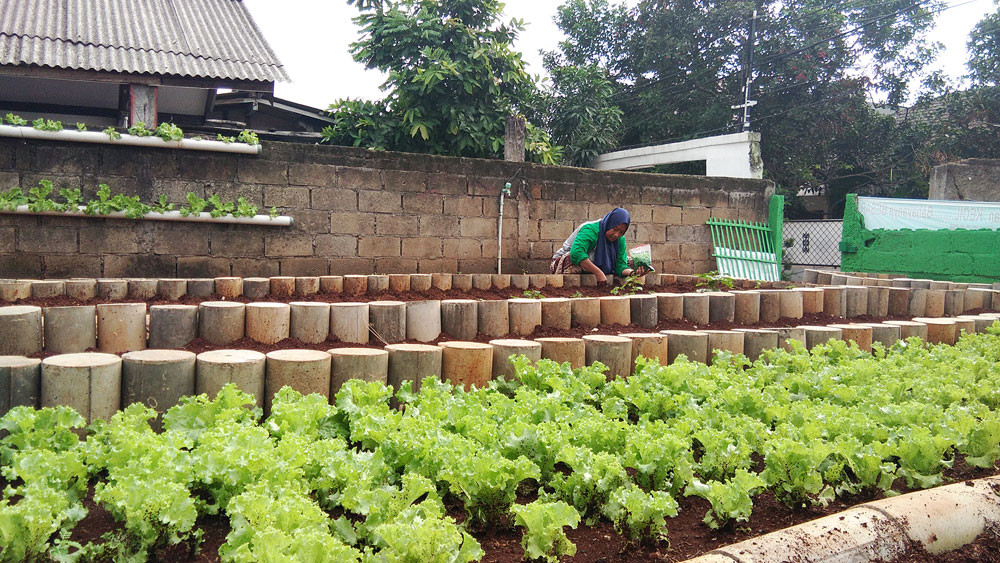Popular Reads
Top Results
Can't find what you're looking for?
View all search resultsPopular Reads
Top Results
Can't find what you're looking for?
View all search resultsIn West Jakarta, landless farmers race against urbanization
Skyrocketing rents for land and the shrinking number of plots available to rent mean life is getting harder for farmers in Semanan, West Jakarta.
Change text size
Gift Premium Articles
to Anyone
 Head of Seruni urban farming group in RW 10 South Kebayoran Lama subdistrict, South Jakarta, Eka Yulianti plants water spinach seeds on Monday. The 290-square-meter garden, located in the densely populated area, can produce up to 80 kilograms of crops including spinach, mustard greens and lettuce. (The Jakarta Post/Vela Andapita )
Head of Seruni urban farming group in RW 10 South Kebayoran Lama subdistrict, South Jakarta, Eka Yulianti plants water spinach seeds on Monday. The 290-square-meter garden, located in the densely populated area, can produce up to 80 kilograms of crops including spinach, mustard greens and lettuce. (The Jakarta Post/Vela Andapita )
A
sdedi, 37, has been planting rice in Semanan, Kalideres, West Jakarta, since he arrived Jakarta in 1997, after his goldfish business in Subang, West Java, went bust.
“I have been here since 1997, and straight away farmed rice,” Asdedi told The Jakarta Post on Monday.
He could not afford to buy land at that time and decided to rent plots belonging to developer PT Citra Adyapataka for farming.
Asdedi said he rented 36 plots at that time, paying around Rp 500,000 (US$35) per three months per plot. Each plot was about 1,000 to 3,000 square meters (sqm). He mainly planted rice but in the past also planted shallots.
Nowadays he is only able to rent and work one plot.
Skyrocketing rents for the land and the shrinking number of plots available to rent make life harder for farmers in Semanan.
Asdedi said his only plot was quite productive, even though it is irrigated by water from a nearby canal that is contaminated by household and industrial waste. One hectare produces six tons of rice, priced at Rp 4,000 per kilogram in the rainy season and up to Rp 6,000 per kilogram in the dry season.
He said that the farmers in the area used to be members of the Karya Tani farming group, which is a part of the larger Watabullah farming group supervised by the West Jakarta Maritime, Fisheries and Food Security Agency (KPKP West Jakarta).
However, most have given up farming, leaving only 11 active members. They were forced to find other jobs because land owners decided to build on their plots and being only tenants the farmers had to move on.
“[We farmers do] not own the land, only cultivate vacant plots,” Asdedi said.
He said he did not know for how long he could keep his farm, but had devised a plan for it.
He said that he wanted to breed betta fish, and hoped to rent a kiosk at Semanan Flora and Fauna Business Center, which is located next to his current paddy field.
“I have practiced [breeding fish] in the last two years and I have produced 1,500 betta fish,” he said.
Kuyab, 60, another farmer, is not worried about not farming in the future, as he is currently employed as a water unit worker with the Jakarta Environment Agency, tasked with cleaning up the river right in front of his house.
“If I am still employed at the water unit, I will still be here,” he said.
The man who was born and raised in Semanan said that, despite farming since 1986, it was not his only source of income. He used to work as a construction worker before being employed at the water unit.
Kuyab said that currently he only rented three plots measuring around 7,000 sqm. for planting rice, but lately had encountered troubles with pests. He also no longer directly works in the field, but instead employs others to watch over the rice crops.
For Tarsiman, 56, farming in Semanan is his only source of income, leaving him few choices if the land owner decides he can no longer rent the seven plots that he currently works on.
“I will have to go back [to my hometown Subang],” Tarsiman said.
He has planted rice in six plots, and currently is preparing seeds, while using one plot to rear catfish.
According to 2018 data from the Agriculture Ministry, there are 458 farmer groups (Poktan) and 78 combined farmer groups (Gapoktan) in Jakarta.
KPKP Jakarta head Darjamurni said that for farmers such as those in the Karya Tani farming group, the agency could not do much about their current land issues because land owners had full rights over their land.
He said the administration still owned 9 hectares of land for agriculture in Cengkareng, West Jakarta, which could be a new spot for the Semanan farmers.
“We will invite [the farmers] to discuss [the possibility of moving to Cengkareng for farming]. I think that has potential,” Darjamurni told the Post.
Separately, KPKP West Jakarta head Marsawitri Gumay said the agency would offer skills training for farming group members especially in Semanan if they wanted it.
“We will also help with their permits, promotion, marketing and give references if they want to borrow from the bank, all in the agency’s entrepreneurship program,” she said, as quoted by beritajakarta.id.
Darjamurni said the agency was currently developing horticultural urban farming among Jakarta’s farming groups, and if there was any available land, rice farming would also encouraged.
He said that the agency also had 5 hectares of rice fields in East Jakarta for agriculture research purposes.









